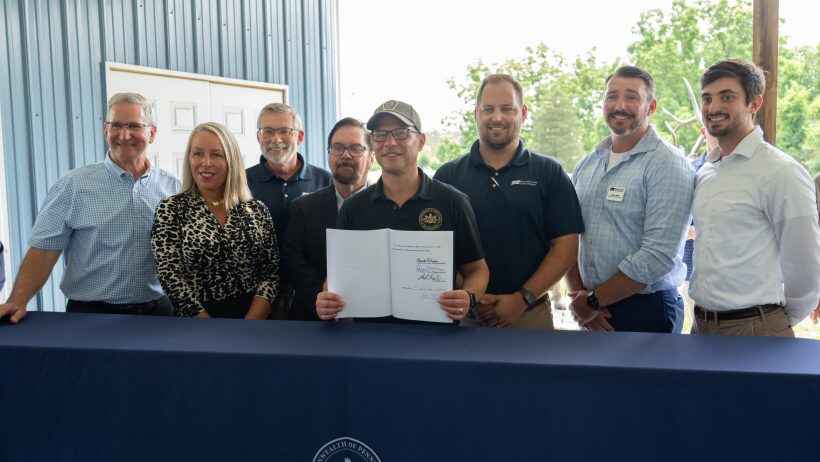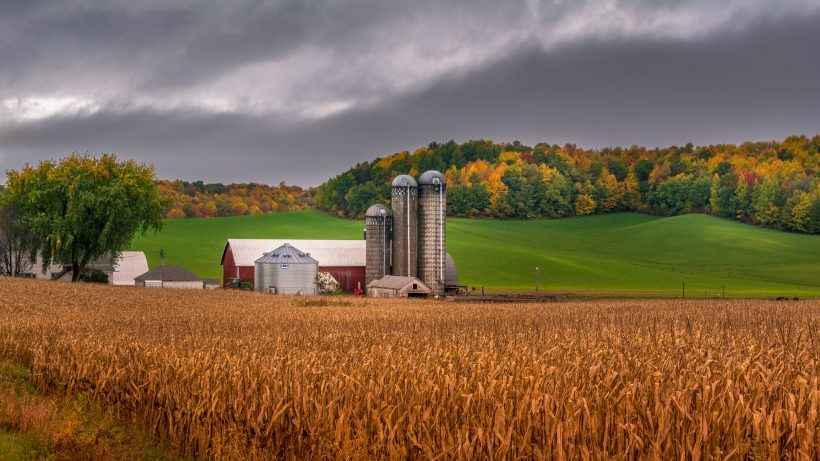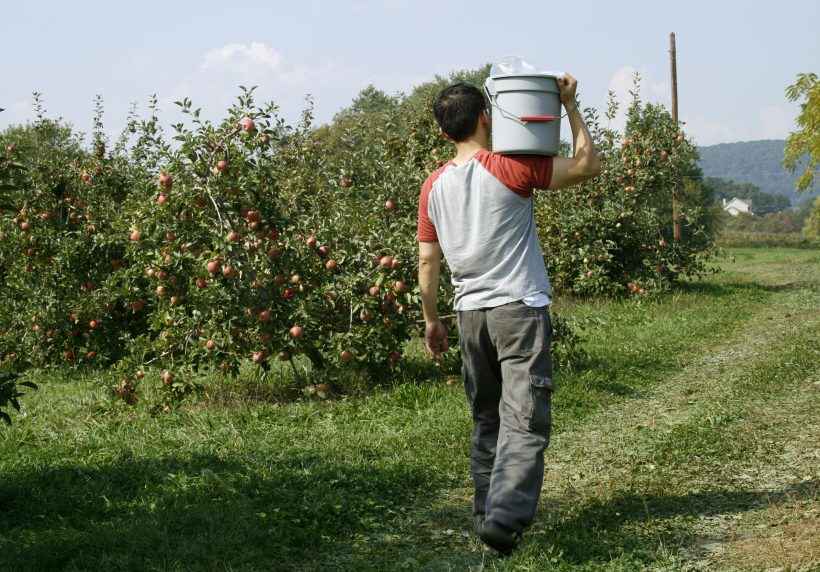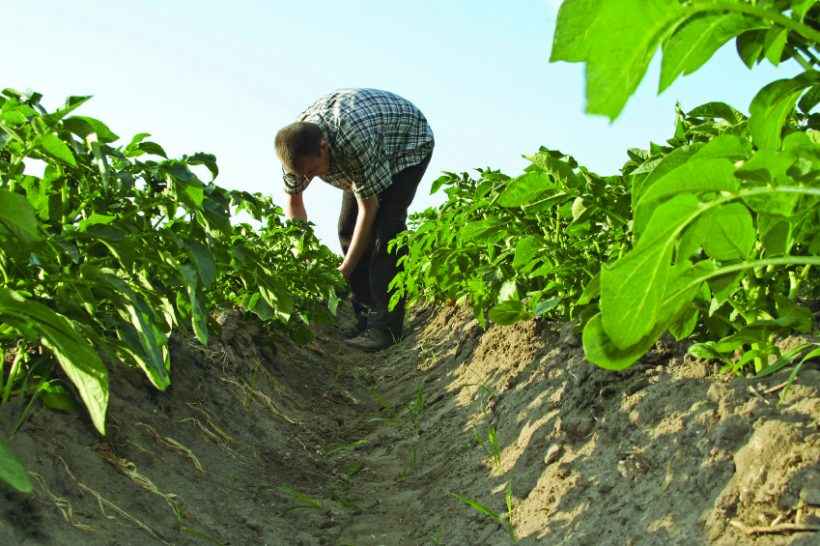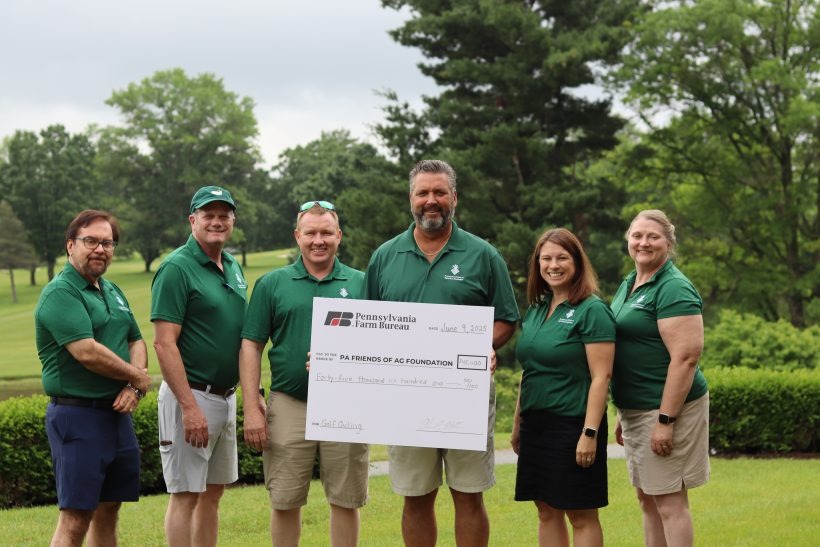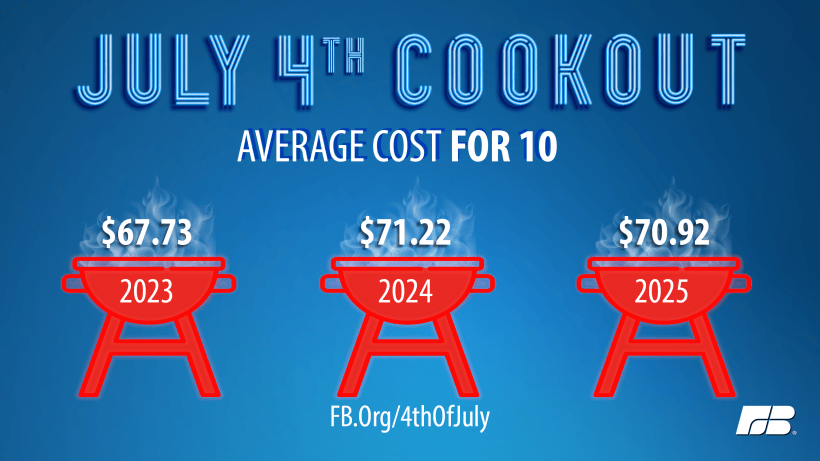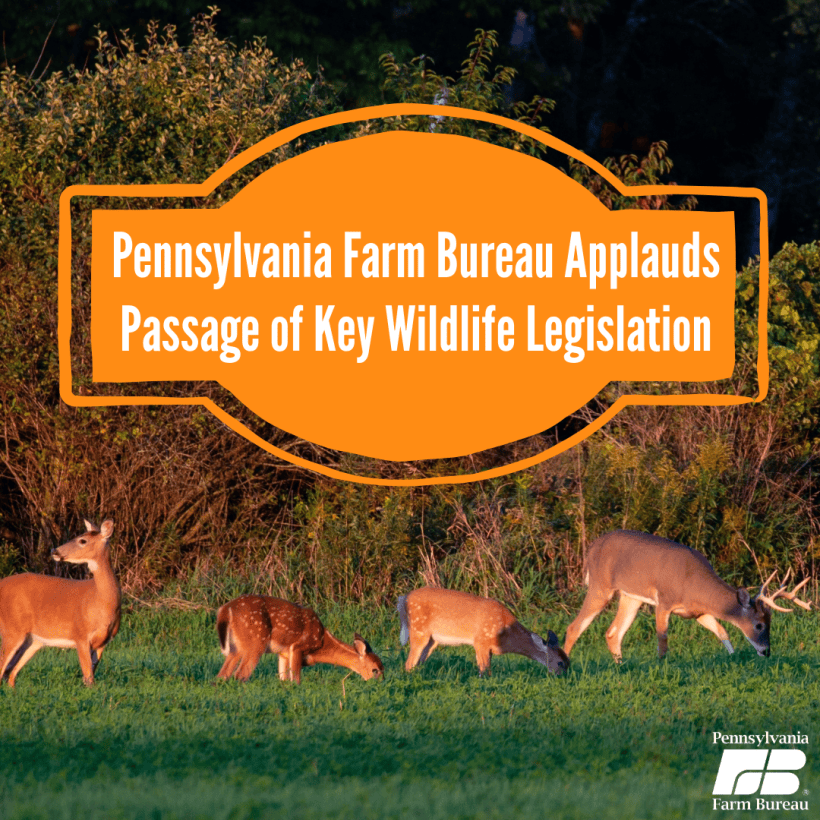Pennsylvania Farm Bureau is pleased to see House Bill 1431, Act 36 of 2025 and Senate Bill 518, Act 26 of 2025, signed into law by Governor Josh Shapiro. On Wednesday, Shapiro signed House Bill 1431 into law at Blue Ridge Sportsman Club in Dauphin County, concluding a more than two-year effort to pass meaningful legislation toward finding an equitable solution for crop damage in Pennsylvania.
Pennsylvania Farm Bureau members have continuously voiced their concerns about a growing deer population, resulting in devastating financial losses for farmers across the commonwealth.
“When the standard greeting when you are out somewhere is about deer damage, you have a problem,” said Russell Redding, Pennsylvania Secretary of Agriculture at the bill signing press conference. “Every time I would go somewhere, every county fair, every legislative breakfast, every time you’d turn around there was a deer damage concern and Farm Bureau was constructive in that and very pointed in that we have to address these issues.”
For years, Pennsylvania Farm Bureau stood in opposition to Sunday hunting, primarily due to trespassing concerns, but as the issue of unmanageable crop damage became more and more apparent, Pennsylvania Farm Bureau’s grassroots members began searching for answers.
At Pennsylvania Farm Bureau’s 2023 Annual Meeting, a two-thirds vote by the organization’s voting delegates decided to revoke their opposition to Sunday hunting, provided that several Farm Bureau priorities on addressing wildlife damage were passed simultaneously with, or prior to, the passage of Sunday hunting legislation.
“Delegates representing Pennsylvania Farm Bureau members voted to remove their opposition to Sunday hunting in 2023, contingent upon the implementation of significant statutory and regulatory changes addressing crop damage from wildlife and hunting management on farmland,” said Andy Bater, PFB State Board Director and chairman of PFB’s Wildlife and Fisheries Committee. “This policy shift fostered unprecedented collaborative efforts between Farm Bureau, the Pennsylvania Game Commission, and statewide hunting organizations.”
USDA estimates from federal crop insurance data show that Pennsylvania suffered north of $20 million in losses on corn in 2017 – the highest reported number in the nation. That same study showed that Pennsylvania farmers suffered north of $15 million in losses to soybean crops in 2017.
“For many farms, the same fields that grow food for our tables have also fed the local deer population. For just as long, hunters have played a critical role in keeping that population in balance,” Redding said. “As deer populations have grown and farming has become more intensive and vulnerable, that balance started to tip away. We reached a point where cooperation isn’t just a tradition, but a necessity. The trespassing provisions are noted here, and we know that the majority of hunting takes place on private property, so those relationships and the respect that is shown between hunters and landowners is critical.”
Even off the farm, it’s hard to drive anywhere in the rural parts of Pennsylvania and not pass a deer carcass on the side of the road, as the number of car accidents directly tied to deer are rapidly growing across the Commonwealth.
A national study conducted by State Farm Insurance Company reported that 1.8 million auto insurance claims were filed nationwide between July 1, 2022, and June 30, 2023. Of those claims 153,397 claims came from Pennsylvanians – the highest number in the nation. That same study noted that Pennsylvania drivers had a 1 in 59 chance of getting into an accident involving wildlife – the third highest mark in the country.
PennDOT data from 2024 shows that there were 6,421 accidents in the state that were directly or indirectly caused by deer. At least 1,503 people were injured and 19 people were killed in those crashes.
This legislation benefits both the agricultural and hunting communities and is a direct result of ongoing collaboration by Pennsylvania Farm Bureau and other industry stakeholders. Senate Bill 518 and House Bill 1431 are positive steps toward modernizing state wildlife policy as farmers continue to face rising input costs and increasing amounts of crop damage.
“Pennsylvania Farm Bureau proudly supports Senate Bill 518 and House Bill 1431, key pieces of legislation developed in collaboration between wildlife groups and the agricultural community to improve wildlife management and address deer overpopulation,” said Chris Hoffman, President of the Pennsylvania Farm Bureau. “These measures will help farmers better control deer populations, protect their crops, and support the long-term sustainability of agriculture in our state. We thank the general assembly for getting these important bills across the finish line and Governor Shapiro for swiftly signing the bills into law. We look forward to using the tools they gave us to mitigate crop damage and help protect the profitability of our farms.”
Senate Bill 518, introduced by Senator Greg Rothman, amends Title 34 (Pennsylvania Game Code) of the Pennsylvania Consolidated Statutes which stated that it is unlawful to refuse to answer questions from representatives of the Game Commission, violating the Fifth Amendment of the U.S. Constitution which ensures no person may be “compelled in any criminal case to be a witness against himself.” The bill was signed into law by Shapiro on June 30th.
House Bill 1431, introduced by Mandy Steele, is especially important for farmers who continue to face significant crop damage and financial burdens caused by the overpopulation of deer in Pennsylvania. House Bill 1431 includes increased trespass penalties and fully repeals Pennsylvania’s Sunday hunting ban, expanding opportunities for hunters while preserving important protections for landowners through clear written permission requirements. The bill was signed into law by Shapiro on July 9th.
Several key Pennsylvania Farm Bureau priorities that were originally in House Bill 1431 were amended into Senate Bill 518.
The passed version of Senate Bill 518 simplifies the reporting process for crop damage harvest and streamlines carcass handling requirements, which reduces the regulatory burden on farmers by enabling them to spend more time and resources on their day-to-day farming operations. The bill also ensures farmers are represented on the Pennsylvania Game Commission Board by requiring one member of the board to be an individual who is actively engaged in agriculture and understands the critical intersection of agriculture and wildlife management.
Collectively, this legislation has been a longstanding priority for Pennsylvania Farm Bureau, and we thank Governor Shapiro for swiftly signing these bills into law.
Pennsylvania Farm Bureau thanks the members of our coalition, Rep. Mandy Steele, Senator Greg Rothman, Senator Dan Laughlin and all their staff for working together on this legislation. PFB extends its gratitude to its members for their continued advocacy.
“There were a lot of pivotal moments in the legislative process. One that was incredibly helpful if not the most pivotal was the marriage between the agricultural interest, farm interests and the advocates for this legislation,” Shapiro said during the bill signing press conference. “I want to thank the Farm Bureau for their incredible willingness to engage on this.”
Outside of this legislation, Pennsylvania Farm Bureau worked directly with the Pennsylvania Game Commission on creating the Certified Hunter Program, a program designed to help Pennsylvania landowners, particularly farmers, who are dealing with significant crop damage caused by deer and other wildlife.
The program connects landowners with certified hunters trained to manage deer populations effectively. By removing common barriers, the program allows landowners to address crop damage in a safe and efficient manner while maintaining control over who accesses their property. All participating hunters are thoroughly trained in ethics, safety, responsibility, and hunting effectiveness. This initiative promotes sustainable wildlife management, benefiting both landowners and hunters while safeguarding crops throughout Pennsylvania.
The landowner portion of the program is currently a pilot program in the Pennsylvania Game Commission’s Southwest Region, comprised of Allegheny, Armstrong, Beaver, Cambria, Fayette, Greene, Indiana, Somerset, Washington and Westmoreland counties.
While the landowner program is a pilot program in the Southwest Region, you do not need to be a resident of one of those counties to sign up to be a certified hunter. More information on the Certified Hunter Program can be found here.
All in all, the crop damage mitigation tools achieved through this legislation are a huge win for Pennsylvania’s farmers. While Pennsylvania Farm Bureau recognizes that this legislation is not going to solve the problem overnight, it is a great step toward finding equitable solutions to wildlife damage.
“Today is a story of more and less. More days to hunt, more opportunities to bag a deer, more effective deer management, more relief from crop damage and more food on the table,” Redding said. “It’s less crop damage, less habitat destruction and less hunger. That’s a good solution.”





